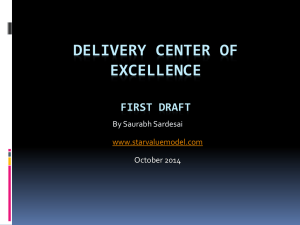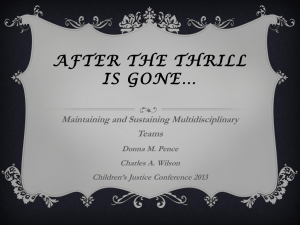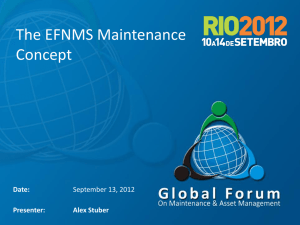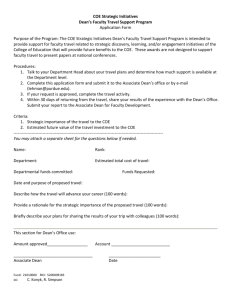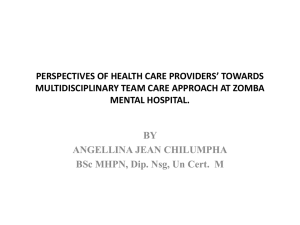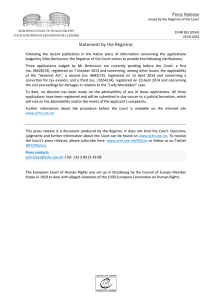COE_Multidisciplinary_Grant_policies.v7
advertisement
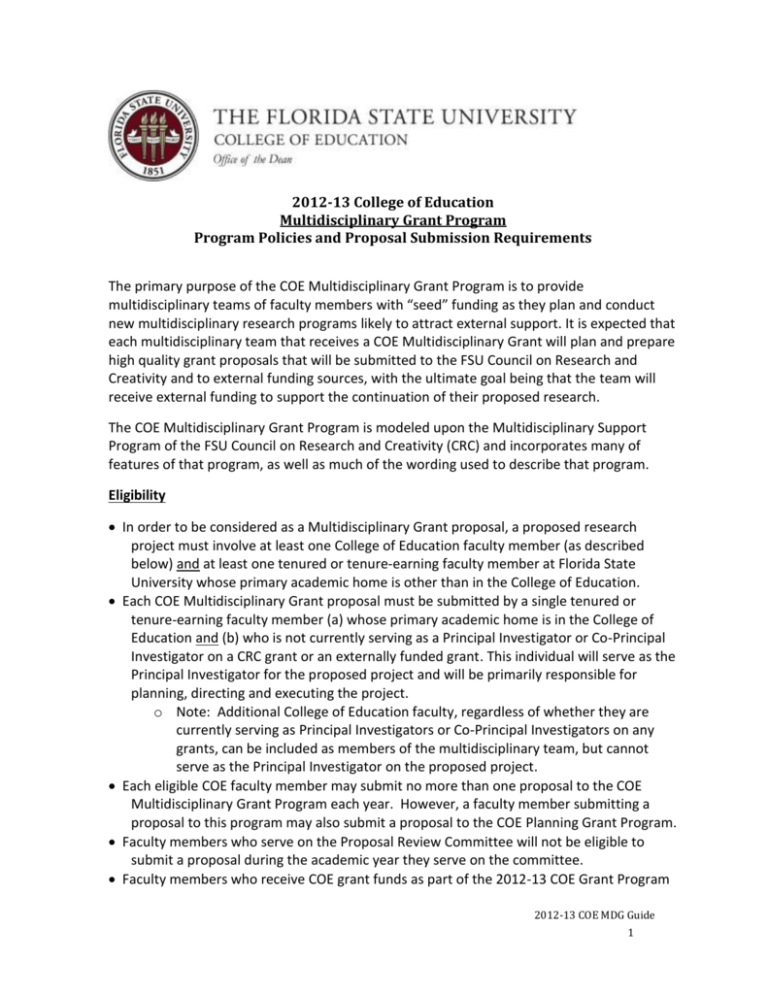
2012-13 College of Education Multidisciplinary Grant Program Program Policies and Proposal Submission Requirements The primary purpose of the COE Multidisciplinary Grant Program is to provide multidisciplinary teams of faculty members with “seed” funding as they plan and conduct new multidisciplinary research programs likely to attract external support. It is expected that each multidisciplinary team that receives a COE Multidisciplinary Grant will plan and prepare high quality grant proposals that will be submitted to the FSU Council on Research and Creativity and to external funding sources, with the ultimate goal being that the team will receive external funding to support the continuation of their proposed research. The COE Multidisciplinary Grant Program is modeled upon the Multidisciplinary Support Program of the FSU Council on Research and Creativity (CRC) and incorporates many of features of that program, as well as much of the wording used to describe that program. Eligibility In order to be considered as a Multidisciplinary Grant proposal, a proposed research project must involve at least one College of Education faculty member (as described below) and at least one tenured or tenure-earning faculty member at Florida State University whose primary academic home is other than in the College of Education. Each COE Multidisciplinary Grant proposal must be submitted by a single tenured or tenure-earning faculty member (a) whose primary academic home is in the College of Education and (b) who is not currently serving as a Principal Investigator or Co-Principal Investigator on a CRC grant or an externally funded grant. This individual will serve as the Principal Investigator for the proposed project and will be primarily responsible for planning, directing and executing the project. o Note: Additional College of Education faculty, regardless of whether they are currently serving as Principal Investigators or Co-Principal Investigators on any grants, can be included as members of the multidisciplinary team, but cannot serve as the Principal Investigator on the proposed project. Each eligible COE faculty member may submit no more than one proposal to the COE Multidisciplinary Grant Program each year. However, a faculty member submitting a proposal to this program may also submit a proposal to the COE Planning Grant Program. Faculty members who serve on the Proposal Review Committee will not be eligible to submit a proposal during the academic year they serve on the committee. Faculty members who receive COE grant funds as part of the 2012-13 COE Grant Program 2012-13 COE MDG Guide 1 will not be eligible to apply for COE grant funds as part of the 2013-14 grant program, but will be eligible to apply as part of the 2014-15 program. Applicants will not be awarded more than one COE grant during an academic year. That is, a faculty member will not be eligible to receive a COE Multidisciplinary Grant and a COE Planning Grant in the same year. Award Amounts and Acceptable Uses Awards will be $4000 per funded proposal. The use of these funds will be determined by the Principal Investigator for the proposed project (i.e., the eligible COE faculty member who submitted the proposal), in accordance with the guidelines listed below: o Award dollars will only be used to hire graduate research assistants. Tuition waivers will have to be covered by other funding sources. o Award dollars will not be used to pay faculty salary, travel expenses, equipment or materials purchases, or any other types of expenses. o Award dollars will be available at the beginning of the spring 2013 semester and must be expended by no later than the end of the fall 2013 semester. Important Dates • Deadline to Apply: Thursday, October 18, 2012, 11:59 PM. This deadline is FIRM, no exceptions! Proposals must be submitted via the COE Office of Research website. Proposals that are not submitted in the proper form via the website by this deadline will not be reviewed by the Review Committee and will not be eligible for funding. • Early November, 2012: Each faculty member who submits an eligible proposal will receive notification as to whether the proposal was funded, as well as the anonymous comments of each reviewer. This information will also be shared with the Dean of the College of Education and the faculty member’s department chair. • Award Period: January 1, 2013 - December 31, 2013 Required Proposal Items Each Planning Grant proposal must include the following three items: 1. A copy of the vita of the Principal Investigator and the vita of each of the other faculty members listed in the proposal. 2. A proposal abstract This document should provide a brief summary (250 words maximum) of the proposed project, including a listing of potential external funding sources. 3. The proposal text This document should consist of each of the numbered sections listed below. The number and title of each section should be clearly listed. 2012-13 COE MDG Guide 2 Be sure to number and title each section exactly as listed below. Proposals that are incorrectly numbered or titled will not be eligible for funding. The numbering of the sections and the descriptions of what should appear in each section closely correspond to that which is required for CRC Multidisciplinary Support (MDS) proposals. However, as noted below, some of the information that you will need to include when you submit a CRC MDS proposal is not required as part of your COE Multidisciplinary Grant proposal. In those cases, your COE Multidisciplinary Grant proposal should only include the number and title of the section; do not include any other information in that section. Each section should immediately follow the previous one, with a double space between sections. Do not put each section on a separate document page! The length of your proposal text should be no more than six single-spaced pages (CRC guidelines specify eight pages; a smaller number is listed here because, as noted, several items the CRC requires are not required in your COE proposal). Required Sections of Your Proposal Text 1. Other faculty: List the full names, primary department affiliations and research interests of the other faculty who will be working on the proposed program of research. 2. Description of proposed program of research: Describe your proposed program of research clearly and concisely, in manner that is understandable to reviewers in other disciplines. It is suggested that you briefly describe (a) the problem/issue that will be examined, (b) the current state of the research that has been conducted in this field, (c) the goals of the purposed research, (d) the research methods that will be employed, and (e) the expected outcomes of the project, with an emphasis on how those outcomes are likely to contribute to knowledge and/or scholarship in this area. 3. State of the research: Guidelines for section three of the CRC Multidisciplinary Support Program call for this information. Assuming you have covered it in section 2(b), you might simply indicate that fact in this section of your proposal. 4. New multidisciplinary research alliance: Briefly describe how the proposed research program will result in the establishment of a new multidisciplinary research alliance at FSU. 5. Relationship to the PI's other currently funded research (if any): Given that COE Multidisciplinary Grant proposals can only be submitted by faculty who currently do not have research funding, leave this section blank. 6. Proposed schedule of activities: List the various activities that will be undertaken as part of the proposed program of research, including the time period during which each activity will occur. (NOTE: the CRC expects that successful external grant proposals will be generated within one year after the awarding of a CRC Multidisciplinary Support grant). 7. Available external sources of support: Other than the section number and title, leave this section blank. (Note: Much of the information the CRC requires in this section 2012-13 COE MDG Guide 3 overlaps with that which will appear in section 10). 8. Permission statement: Indicate, in one sentence, that in the event your proposal is funded, you agree to have it serve as an example of a successful proposal. 9. Approval documents: Other than the section number and title, leave this section blank. 10. Likely Sources of External Funding: List several external funding sources (agencies and/or foundations) that are likely to support the continuation of your proposed research, including, when possible, specific programs, amount of money available in those programs, and other pertinent details. Also discuss how this multidisciplinary grant will enhance your prospects of obtaining external funding; and describe your plans for submitting proposals to these agencies and/or foundations. 11. References: List, in proper bibliographic form (e.g., APA format), the complete reference information for each source cited in the body of your proposal. Requirements for Grant Recipients Within one year after receiving a COE Multidisciplinary Grant, Principal Investigators will be expected to submit at least one external grant proposal to support the continuation/expansion of the research activities of their multidisciplinary research team. To further enhance the effort to receive external support for their research, Principal Investigators who receive a COE Multidisciplinary Grant will be expected to submit an updated version of their multidisciplinary proposal to the CRC by the next deadline for doing so (i.e., by November 15, 2012). By the end of January 2014, each Principal Investigator who receives a COE Multidisciplinary Grant will be required to submit a brief report describing the results of the funding, including a description of (a) the activities that were undertaken as part of the proposed project, (b) grant proposals (internal and external) that were submitted, and whether they were funded, and (c) plans for the next steps in the proposed research program, including plans for future submissions of proposals for external funding. Research Compliance Notes: • Research activities requiring compliance review and approvals (human or animal subjects, DNA, RNA, hazardous materials or marine lab facilities for example) will require the completion and submission of forms to the appropriate FSU department or group, seeking and receiving approval for such research, BEFORE such research is attempted and BEFORE any funds can be released to the PI, if awarded. See human subjects website, site for animal research information, site for Environmental Health & Safety or SRS forms page for other compliance requirements which may apply to your research or performance plan. • You may pre-apply for human subjects or animal use approval prior to funding notifications. If you are funded, this will prevent delays in getting your funds. 2012-13 COE MDG Guide 4 Proposal Review Policies and Procedures • Proposals will be reviewed and rated by a Proposal Review Committee consisting of the COE Associate Dean for Research and one faculty member from each department. o At the beginning of the fall semester, each department will select one tenured or tenure-earning faculty member to serve on the Review Committee. o Each member of the Review Committee will work independently. Each member will review and rate each proposal, including those submitted by faculty members in their own department, using the NIH rating scale currently used by the CRC (see attachment). o Review committee members will be required to submit their reviews and ratings by the end of October. This information will be collected and tallied by the COE Associate Dean for Research. o The anonymous comments and ratings of each reviewer will be shared with each faculty member who submits a proposal, as well as with the Dean of the College of Education and the faculty member’s department chair. Criteria for Judging Proposals The criteria for judging COE Multidisciplinary Grant Proposals are listed on the next page and can also be found on the COE Office of Research website. 2012-13 COE MDG Guide 5 2012-13 College of Education Multidisciplinary Grant Program Criteria for Judging Multidisciplinary Grant Proposals Initial Screening criteria (Note: If any of these criteria are not met, the proposal will not be reviewed by the Review Committee and will not be eligible for funding) 1. Is the faculty member eligible to apply for a COE Multidisciplinary grant? 2. Does the proposal include a copy of the vita of the Principal Investigator and the vita of each of the other faculty members listed in the proposal? 3. Does the proposal abstract provide a brief summary (250 words maximum) of the proposed project, including a listing of potential external funding sources? 4. Is the proposal text properly formatted and numbered, and does it include all of the required sections? Substantive criteria (Note: These are the criteria the Review Committee will employ to judge your proposal) 1. Is the proposal written in clear, concise language that allows faculty from other disciplines to understand the proposed research program? 2. Does the proposed research program address an important issue? 3. Does the current state of the research in this field point to the need for the proposed research program? 4. Are the goals of the proposed research worthwhile? 5. Is the research methodology appropriate? 6. Are the expected outcomes of the project worthwhile? In particular, will the expected outcomes contribute in a significant way to knowledge and/or scholarship in this area? 7. Is it likely that the expected outcomes of the proposed project will be attained? 8. Does the proposal clearly describe how the proposed research program will result in the establishment of a new multidisciplinary research alliance at FSU? 9. Is the proposed schedule of project activities realistic? 10. Does the proposal identify specific likely sources of external funding to support the continuation of the proposed research? 11. Does the proposal describe a realistic plan of action for obtaining that funding? 12. Does it seem likely that external funding will be obtained? Important Note: Given that the ultimate goal of the COE Multidisciplinary Grant Program is that faculty members who receive a Multidisciplinary Grant will receive external funding to support the continuation of their proposed research, the last three criteria on the above list (items 10 12) will be of particular importance in rating each proposal. 2012-13 COE MDG Guide 6
